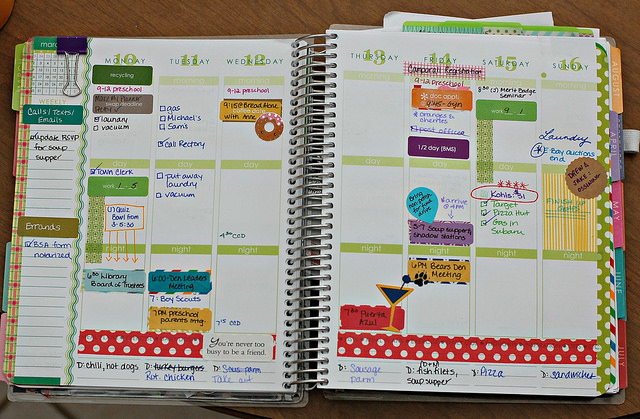
For college students, failure to plan and structure time is frequently the cause of academic struggles. Counterintuitively, college students struggle with time management not because of too little free time, but instead because they have too much free time. In the case of college students, the religious proverb, “Idle hands are the devil’s playthings,” could not be more on the mark.
College students spend less than 15 hours per week in class, with an average of 10 to 15 hours of out of class work to be completed each week (STEM majors work more, as many as 30 or more hours per week). Yet, many college students struggle to successfully fulfill their academic obligations. College students are notorious for sleeping too much, partying too much, and feeling bored and under-engaged. A life that is built around sleeping, partying, and studying/avoiding studying is a dull existence and frequently leads to the worst kinds of unsatisfying and unproductive habits.
Why do college students struggle?
College students struggle with academics, self-care, engagement, and life balance because they do not build any time structure into their days, other than attending scheduled classes (some students can’t even manage that minimal  effort). Parkinson’s Law, that work expands to the amount of time available for its completion, works as a strong negative force in the lives of college students. Most college students allow themselves endless time for the completion of schoolwork and do not break up their day into defined separate chunks of time.
effort). Parkinson’s Law, that work expands to the amount of time available for its completion, works as a strong negative force in the lives of college students. Most college students allow themselves endless time for the completion of schoolwork and do not break up their day into defined separate chunks of time.
Instead, college students treat their days as being composed of two components, in-class time and everything else. Schoolwork that could easily be completed in 2 hours or less is allowed to expand so as to take up 4 or 6 hours or more because of aversion, distraction, and failure to plan and delineate the hours of the day/night. In such a case, efficient use of time is nearly impossible.
New college students are usually blind to the hidden supports and structure that supported their success in high school. The long school day and after school activities are remembered as obligations rather than catalysts to the student’s performance and well-being. On the first day of college, all of the invisible structure that supported a student in high school falls away. If a student does not immediately replace that hidden structure with appropriate allotments for engaging experiences, learning (other than classwork), and quiet relaxation, then he or she will likely have difficulty in personal and academic spheres.
College students prize freedom and resist organization
College students resist commitment and organization. The freedom that college students treasure is the source of their difficulties. The high school day may be long and tedious and 9 to 5 jobs may not nourish workers’ deepest urges, but they provide a stable and healthy structure for productivity. College life provides no such stable and delineated markings of time throughout the day and week. The days and nights of typical college students are endless gray blobs with no conscious separation of activities. Most college students do not separate the day into periods of study time, play time, social time, and relaxation/re-energizing time. Instead, they live an ad hoc existence and respond to stimuli or desires.
To understand the folly of a typical college student’s mindset, see the quotes below:
“I have a psych test tomorrow, guess I should study now.”
“Sure, Melissa, I’ll go to the coffee house with you. I can review my econ notes later.”
“I’ve been lounging all day, but I’m still so tired”
“Next thing I knew, it was 3AM. There was no way I could make it to my 8:30 biology lab.”
“I started reading my history chapter right after my English class ended at 3, but it took me until 8pm to finish it because I kept getting distracted by my phone.”
Simply by structuring their days and nights into realistic and well-separated periods and specific tasks, most college students could experience an instant jump in satisfaction and happiness. By planning the week ahead and allotting specific time to specific tasks and activities, a college student’s effectiveness and productivity will substantially increase.
A minimal amount of structure and planning can dramatically improve college students’ lives and grades
A minimum of structure, responding appropriately to a student’s schedule, needs, energy flow, and priorities can transform a college kid’s life. Instead of endlessly wasting time avoiding work and vegetating, a successful student is conscious and realistic about the time necessary to complete specific tasks. He or she can then plan the day as needed.
Martin is a great example of a busy, happy, and successful college student. He works 10-15 hours per week in the evenings at the local children’s hospital where he shadows the doctors in ophthalmology. Martin is a pre-med student and he needs 15-20 hours of time outside of class each week to complete his work as well as read and take notes in preparation for the upcoming week. He is honest with himself about his sleeping and exercising needs, which are in the normal-above average range compared to others, so he takes care of those with consistent habits and routines.
Take a look at Martin’s weekly plan:
Monday
8:30am Wakeup, Shower
9:00am Breakfast
9:30-10:30am Biology 310
10:30-12pm 2 study sessions of 40 minutes with a 5 minute break between
12-1pm Lunch and coffee w/friends
1-2pm US Government 145
2-3:30pm Nap
3:30-3:45pm Snack
3:45-4:30pm Study session of 45 minutes
4:30-6pm Hanging out in dorm w/friends
6-7pm Dinner
7-8pm Workout, Shower
8-8:45pm Study session of 45 minutes
9-11pm Watch Houston Rockets w/friends
11-12am Wind down and listen to music
12am Bedtime
Tuesday
9am Wakeup, Shower
9:30 Breakfast
10-10:45am Study session of 45 minutes
11-12:30pm Chemistry 366
12:30-1:30pm Lunch and hangout in dorm
1:45-2:15 Human Biology 334
2:30-3:30 Workout, Shower
3:30-4:30 Nap
4:45-5:45 Human Biology 334 Lab
6-7pm Dinner
7-7:45pm Study session of 45 minutes
8-10pm DJ slot at college radio station
10-11:30pm Hang out at fraternity house
11:30-12am Wind down, read blogs on phone
12-12:30am Send texts to friend at school back home
12:30am Bedtime
Wednesday
8:30am Wakeup, Shower
9:00am Breakfast
9:30-10:30am Biology 310
10:30-12pm 2 study sessions of 40 minutes with a 5 minute break between
12-1pm Lunch and coffee w/friends
1-2pm US Government 145
2-3:30pm Nap
3:30-3:45pm Snack
3:45-4:30pm Study session of 45 minutes
4:30-6pm Outdoors Club meeting
6-7pm Dinner
7-8pm Netflix
8-8:45pm Study session of 45 minutes
9-11pm Netflix
11-11:45am Study session of 45 minutes
12am Bedtime
Thursday
9am Wakeup, Shower
9:30 Breakfast
10-10:45am Study session of 45 minutes
11-12:30pm Chemistry 366
12:30-1:30pm Lunch and hangout in dorm
1:45-2:15 Human Biology 334
2:30-3:30 Workout, Shower
3:30-4:30 Nap
4:45-5:45 Human Biology 334 Lab
6-7pm Dinner
7-7:45pm Study session of 45 minutes
8-10pm Student Union for standup comedy night
10-10:45pm Review notes for Friday’s Biology quiz
10:45-12:45am Shadowing shift at Children’s Hospital
1am Bedtime
Friday
8:30am Wakeup, Shower
9:00am Breakfast
9:30-10:30am Biology 310
10:30-12pm 2 study sessions of 40 minutes with a 5 minute break between
12-1pm Lunch and coffee w/friends
1-2pm US Government 145
2-3:30pm Nap
3:30-3:45pm Snack
3:45-4:30pm Study session of 45 minutes
4:30-5:15pm Nap
5:15-5:45pm Dinner
6-9pm Shadowing shift at Children’s Hospital
9:15-9:30pm Shower
9:30-1am Party at fraternity house
1:15am Order pizza
1:45-2am Eat pizza w/roommate
2:15am Bedtime
Saturday
10am Wakeup, Shower
10:30-12pm Breakfast, coffee w/friends
12:30-1pm Watch college football in dorm lounge
1pm Snack
1:15-5:15 Shadowing shift at Children’s Hospital
5:30-6:15 Study session of 45 minutes
6:30-7pm Dinner
7-7:45 Study session of 45 minutes
7:45-9pm Nap
9:15-9:30 Go for a walk around the neighborhood
10-12am Go to movies at Student Union
12:15-12:30 Facebook
12:30-12:45 Wind down with music
12:45 Bedtime
Sunday
10am Wakeup, Shower
10:15-11am Breakfast
11:15-4pm Shadowing shift at Children’s Hospital
4:15-5pm Nap
5:15-6:15pm Workout
6:15-6:45pm Shower, relax
6:45-7:15 Dinner
7:30-8:15 Study session of 45 minutes
8:15-8:30 Facebook
8:30-9:15 Study session of 45 minutes
9:15-12am Watch Sunday Night Football w/friends
12:15 Bedtime
Martin spent 15 and 1/4 hours on school work in the week outlined above and still had plenty of time for good rest, 4 workouts, lots of social and fun time, and an nearly 15 hours at an internship/shadowing post at the Children’s Hospital. Surely, a busy week, but in no ways overwhelming in the work output. Martin is the kind of student who will be a great candidate for medical school as his 3.75 GPA and strong resume will catch any admission staff’s eye.
This kind of interesting, fun, and productive life is available to any college student who puts some time structure into his or her life. Instead of endless hours of aversion and wasted time, Martin spent his time on his passions and outlets for fun: college radio DJ work, Outdoors Club, his fraternity, and learning his trade as a future opthamologist.
If you or your child is struggling to achieve solid performance and satisfying experiences at college, then you need our College Life Management Program. We can teach and support any college student as they discard old habits and integrate new, healthy, productive and satisfying routines. We build a custom personal organization and time-management tool for every college student that we work with. On a weekly basis we guide the student as they plan, review, and hold themselves accountable to goals and results.
